Lei Feng network (search "Lei Feng network" public number attention) by: The author of this article Chen Xing, focusing on optical positioning system research, worked for Huawei Suzhou Research Institute and other well-known domestic IT companies. He has worked in the virtual reality industry for more than two years and is currently working as director of the VR daily content development department.
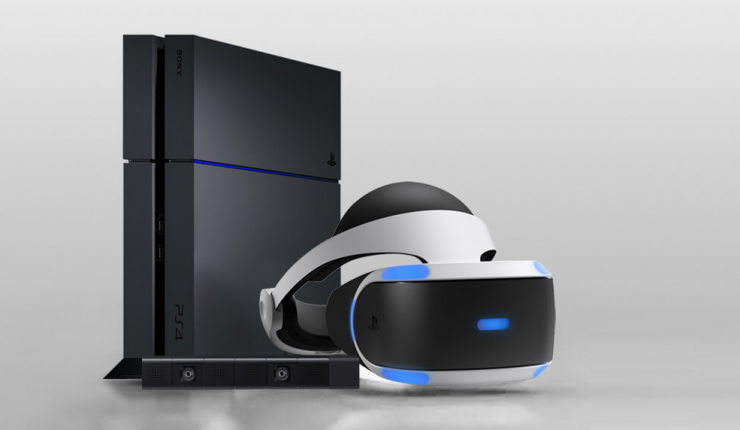
Sony PlayStation VR China sales will be launched simultaneously with the world on October 13, 2016.
Among the detailed parameters of the PlayStation VR, there is a clear difference between the data and mainstream products currently on the market, that is FOV (field of view). The viewing angles of the HTC Vive and Oculus Rift are both 110 ° , while the PlayStation VR has a narrower viewing angle than the two products, only 100 ° .
As one of the top three mainstream virtual reality headlines that consumers place high hopes on, coupled with the reputation of the famous Sony Dafa, the viewing angle of 100° does make consumers feel a little surprised. Because the angle of view is an important indicator that affects the immersiveness of virtual reality. Does Sony have some other considerations?
Why is the field of view so importantField of View (FOV), English Quan Pin is Field of View. In the definition of the display system, the angle of view refers to the angle between the edge of the display and the eye. As shown in the figure below, the AOB angle is the horizontal field of view angle and the BOC is the vertical field angle. The angle of view defined in the virtual reality headset is generally referred to as the horizontal field of view angle.
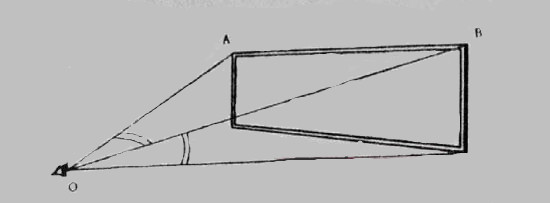
Everyone knows that the visual function of the human eye is composed of binocular vision sites. The total field of vision of human eyes is nearly 200°, binocular vision area is about 120°, and 40° monocular vision areas are on both sides of the body.
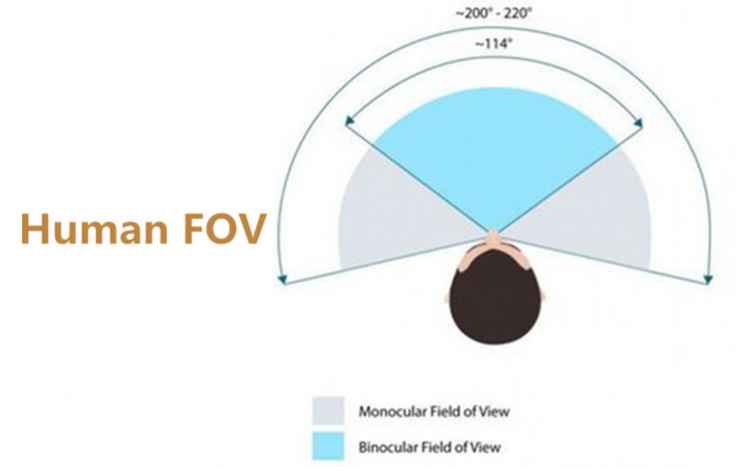
In the normal vision situation, humans obtain visual perception through both eyes, and the retinas of the two eyes do not have the same imaging of the same visual object. After processing the image information from the two eyes in the advanced center of the human brain vision, the formed parallax can assist in producing a fine depth perception, thereby producing stereoscopic vision.
In the definition of virtual reality heads-up, the closer the FOV is to the natural eye angle of the human eye, the better the immersiveness and presence. However, in the virtual world, humans still obtain the virtual scene through the stereo binocular field of view. The larger field of view can satisfy the user to see more details and produce a deeper sense of immersion.
In this era of pursuing a large field of view , obtaining a larger field of view will inevitably bring about other problems.
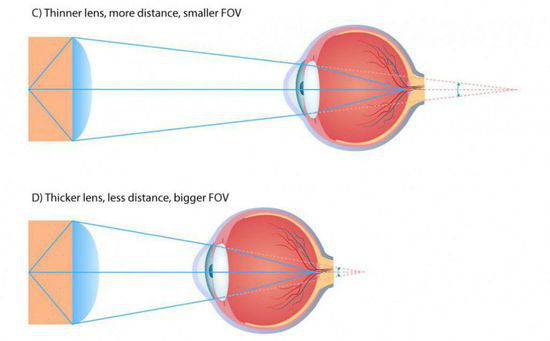
The existing technical conditions, to obtain a larger angle of view, there is only one solution to the problem, that is, the human eye shortens the distance between the lens lens or increases the size of the lens lens. To shorten the distance between the lens and the lens, due to the distance between the lens and the eye, the following defects will be caused: due to the difference between the lens and the convex lens of the human eye, the human eye cannot see the picture clearly, even if it is barely seen, the magnification is too high. The screen effect of the screen will be very serious and may also cause damage to the eyes.
The use of larger diameter lenses to increase the field of view will also cause problems. The center of the large lens is relatively thick, resulting in an increase in the weight of the lens. Although this problem can be solved by the Fresnel lens, the problem of aberration, such as optical distortion, cannot be solved because of the larger diameter of the lens lens.
Sony's choiceIn the market where mainstream products also achieved a 110° field of view, Sony chose a 100° field of view with a lower risk and more security. At the same time, more elaborate details are embedded in the design as compensation.
Details: The mono-ocular field of view of the human eye is biased toward both ears.
Let's make an experiment demonstration for everyone.

After closing the right eye, the right hand stretches out one finger and moves to the right. After moving to a certain degree, the left eye will not see the right hand finger. Even if the left eye rotates to the right, it cannot be seen. Because the nose acts as an obstacle in the middle.

Subsequently, the right eye was opened and in the condition of both eyes, although the right-hand finger could be seen, it was only the monocular vision of the right eye that saw this finger.
PlayStation VR embeds this detail into the design with great precision.
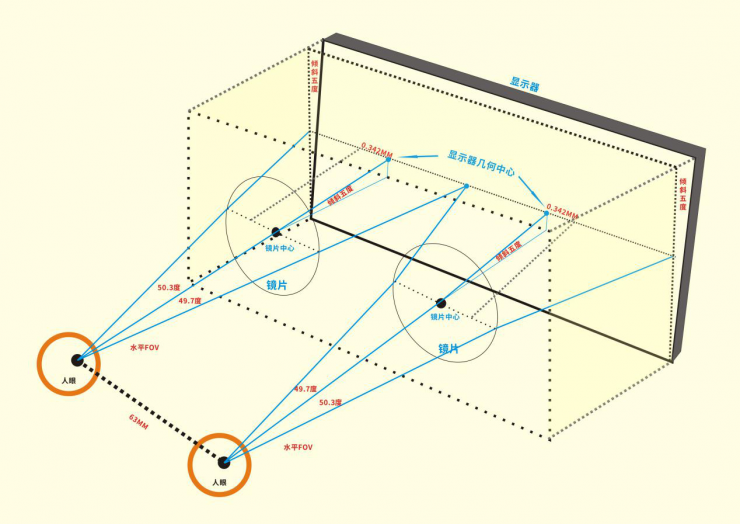
In the horizontal field of view of the PlayStation VR lens, the angles of view of the eyes toward the nose (the right half of the left eye, and the left half of the right eye) are slightly smaller, although smaller, but the center of vision, the corresponding screen The most important part is used for focusing; the angles of view of the eyes toward the ear (the left half of the left eye and the right half of the right eye) are slightly larger. Although they are large, they are more visual peripherals. Perceive part of the movement.
Of course, this design is not perfect, but also flawed. From the figure, it is not difficult to find that the center of the OLED screen of the sub-pixel matrix is ​​not aligned with the axis of the lens. This is why the center of the screen is not at the geometric center of the screen, but is 0.342 off-center. Another center of millimeters.
Such deviations need to be solved by algorithm correction.
In the vertical field of view angle of the PlayStation VR lens, the vertical field of view is slightly smaller on the upper side, and the angle of view below is slightly larger; our neck, our head, our eyes are affected by gravity, and slightly downwards. habit. So the PlayStation VR's OLED screen is slightly offset by about 5° on the basis of parallelism with the lens.
By the same token, this also needs to be corrected by an algorithm.
Detail 2: Binocular field of view is the focus area of ​​human eye vision
When designing virtual reality heads-up, the core is how to match the lens FOV on the human eye FOV and HMD to achieve unity.
However, for the human eye, what is more important than the FOV is the visual field of the retina-drawn image, which is the maximum span of the image seen by the human eye in a state of stable fixation, such as that of the human eye. The imaging area is 174° horizontal and 135° vertical, while the bird imaging area has 360°. The person's monocular visual field is 114°. Enjoying binocular vision is 54° between the left and right eyes. The outer 60° area is actually monocular, so the visual system receives a binocular visual field. The imaging span on the retina is 60 x 2 + 54 = 174°.
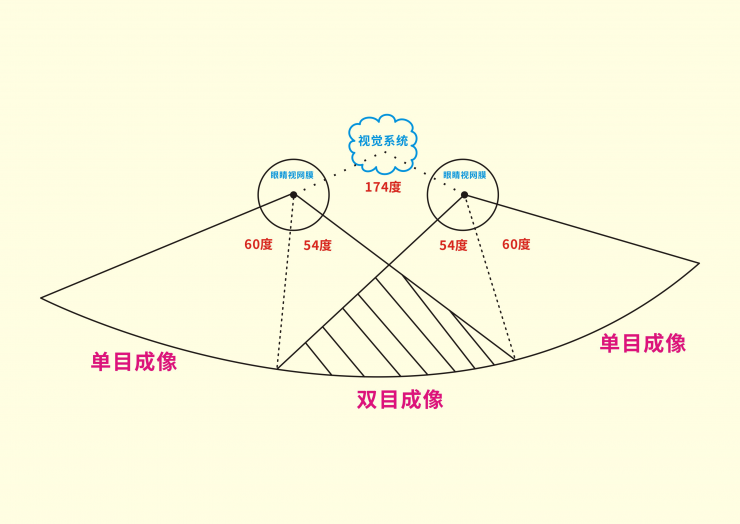
Then we may wish to expand and extend the above map. At this time, we found that the area where the two eyes overlap in the middle 54° is precisely where the human eye focuses and is the visual area where humans perceive the details of colors and objects. The visual periphery is responsible for sensing the movement and the shape of the object. After that, if you need to perceive details, the human eye will turn.
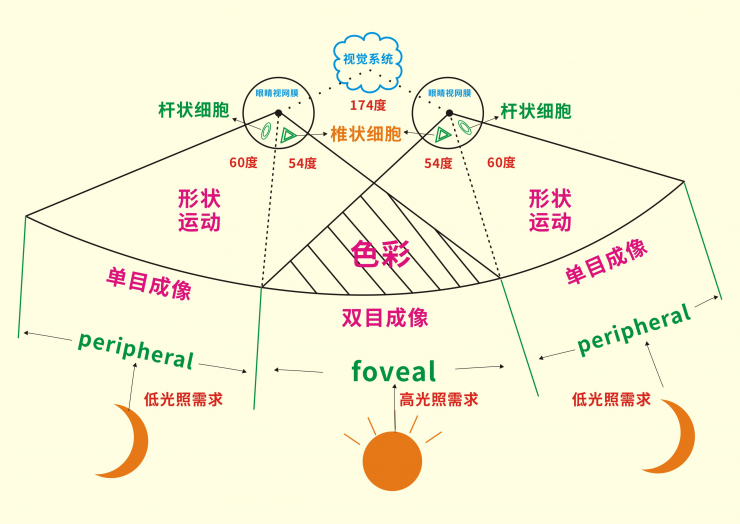
Although the PlayStation VR has only a 100° field of view, it has completely included the binocular imaging human eye focus area. For these areas, the high light conditions given by OLED screens can fully meet the needs of human eyesight. Under the current technology conditions, the selection of this angle of view is precisely the best choice under the premise of satisfying the user's needs to the greatest extent, or the most economical choice.
This article is published by the author's exclusive license to Lei Feng network, reproduced please contact the authoritative, not to revise articles.
ShenZhen Fahold Electronic Limited , https://www.fahold.com